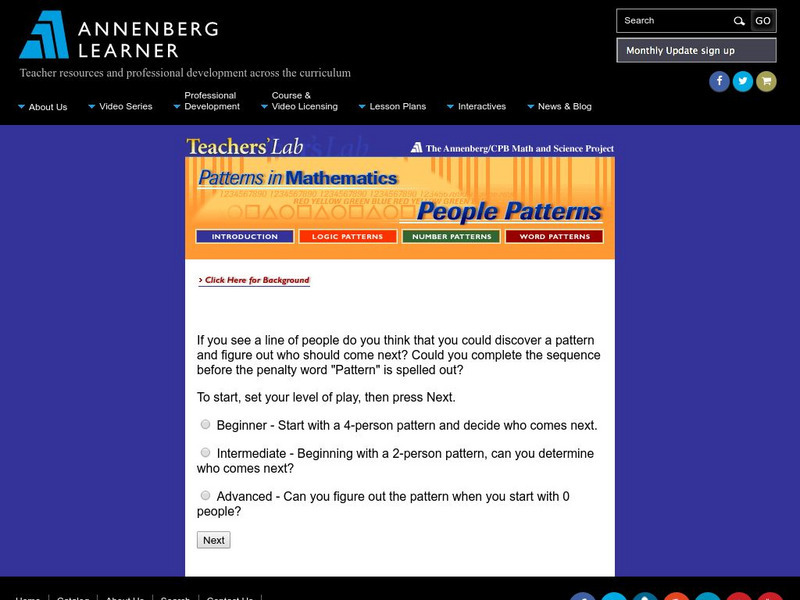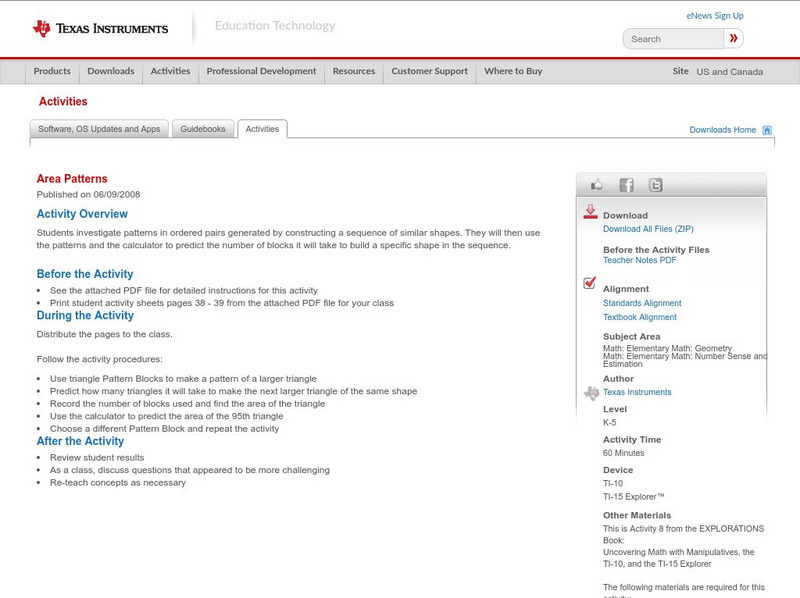Hi, what do you want to do?
PBS
Wnet: Thirteen: Patterns to the Rescue
Patterns and sequences of numbers are explored through this lesson.
Annenberg Foundation
Annenberg Learner: Patterns in Mathematics: People Patterns
This interactive website offers young students an opportunity to discover the pattern and predict who will come next. Feedback and guidance are given for each response. It also offers three increasingly difficult levels that are available.
CK-12 Foundation
Ck 12: Elem Math: Predicting the Missing Decimals in a Sequence
[Free Registration/Login may be required to access all resource tools.] For this learning module, students are presented with a series of decimal numbers and must identify the pattern and fill in the missing numbers. Includes video...
Shodor Education Foundation
Shodor Interactivate: Sierpinski's Carpet
Step through the generation of Sierpinski's Carpet, a fractal made from subdividing a square into nine smaller squares and cutting the middle one out. Explore number patterns in sequences and geometric properties of fractals.
Texas Instruments
Texas Instruments: Area Patterns
Students investigate patterns in ordered pairs generated by constructing a sequence of similar shapes. They will then use the patterns and the calculator to predict the number of blocks it will take to build a specific shape in the...
CK-12 Foundation
Ck 12: Elem Math: Finding and Completing Growth Pattern Sequences
[Free Registration/Login may be required to access all resource tools.] In this learning module, students must identify a simple pattern in a series of numbers and continue the pattern. Includes video demonstrating a sample problem...
CK-12 Foundation
Ck 12: Elem Math: Predicting the Next Decimal in a Sequence
[Free Registration/Login may be required to access all resource tools.] In this learning module, students are presented with a sequence of decimal numbers and they must identify the pattern rule and predict the next decimal. Includes...
Other
Mathsframe: Sequences
Students can solve number sequences and skip count with positive and negative whole numbers and decimals.
ClassFlow
Class Flow: Match Sequences Algebra
[Free Registration/Login Required] In this flipchart, students investigate patterns and sequences used in constructing various shapes using match sticks. Students then develop their introductory algebraic sense by determining the formula...
CK-12 Foundation
Ck 12: Elem Math: Finding and Completing Growth Pattern Sequences
[Free Registration/Login may be required to access all resource tools.] Students practice identifying and continuing number patterns.
Topmarks Online
Topmarks: Shape Patterns
Shape Patterns is a sequencing game where children from 3 to 8 years of age need to complete the pattern of different coloured 2D shapes. Three levels of difficulty.
ClassFlow
Class Flow: Sequences Finding Patterns
[Free Registration/Login Required] This flipchart explores number sequences and patterns. Students figure out the pattern and then predict and find solutions for numbers further on in the sequence. Activote questions are included.
Shodor Education Foundation
Shodor Interactivate: Koch's Snowflake
Step through the generation of the Koch Snowflake, a fractal made from deforming the sides of a triangle, and explore number patterns in sequences and geometric properties of fractals.
Topmarks Online
Topmarks: Paint the Squares
An interactive number chart resource with 8 different sized number grids including a regular hundred square provides a way to explore number patterns. Charts are printable and excellent for demonstrating number sequences on interactive...
Better Lesson
Better Lesson: Number Puzzles
SWBAT apply their understanding of patterns on the hundreds chart and the counting sequence to create a number chart.
















